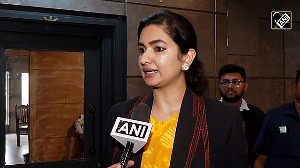 It's a classic David versus Goliath duel.
It's a classic David versus Goliath duel.
On the one hand are the minnows; on the other, giants. But the tiny ones are beginning to challenge the big boys on their turf, making them squirm in their seats.
Take the case of the New-Delhi-headquartered VI-John Group.
They are among the largest manufacturers of shaving cream in India, with a share of 30 per cent against Gillette's share of nine per cent, according to Nielsen data quoted by company officials.
And, the irony is nobody even knew of the brand and that it produced more volumes (over 130 million shaving units a year) than many others in its space had it not been for actor Shah Rukh Khan's endorsement of the product.
Harpreet Sachdeva, a director at VI-John, admits that Khan's endorsement, visible on television for the last few years, did help get the brand noticed.
Interestingly, VI-John has been working up a lather for well over four decades now mainly in the hinterlands of north India. Market experts say that VI-John's success has been primarily due to its incredible penetration and reach in small towns and rural areas.
"They've had a bottom-up approach," says an industry source who declined to be quoted. "While Gillette has been a brand for the urban cool, VI-John was content targetting the rural folks."
That is up until now, of course.
With Khan's endorsement even urban consumers are now beginning to take note of VI-John, says Sachdeva.
But the company hasn't stopped there.
Its hair remover also under the flagship name, endorsed by actor Bipasha Basu, ranks among the top in its segment, Sachdeva claims, competing with the likes of Anne French and Veet.
He declines to give market share numbers to justify his claim.
While the celebrity endorsement route has helped VI-John build an identity for itself outside the rural heartland, the challenge for Ahmedabad-based Vini Cosmetics was completely different - to stand out in a cluttered deodorant environment.
At Rs 1,800-crore (Rs 18 billion), the deodorant market in India has simply exploded in the last few years thanks to the entry of a number of players, both big and small.
Almost 65-70 per cent of this market is targeted at men alone, so new brands need a unique selling proposition to survive, say market experts.
"We studied the market carefully to see if there were need gaps we could address," says Darshan Patel, managing director, Vini Cosmetics.
"We soon realised that the amount of essence or perfume in a deodorant was not high. This resulted in wastage when sprayed. Our idea was to have a product that addressed this need," he says.
The company launched Fogg about a year ago on the platform 'No Gas, Only Perfume', pricing it at a slight premium to rivals such as Axe from Hindustan Unilever.
While Patel declines to give market share details, saying it is a new entrant, industry sources says Fogg has been doing well in channels such as modern trade, which is considered a good
Patel says that Fogg, which is available in variants targeted at both men and women, is doing sales of about 300,000 units per month at the moment from a miniscule number earlier.
"People wondered whether we were really different from the rest. But in the last eight to nine months, we've made steady progress thanks to consistent advertising," he says.
Market experts say that creating blockbuster products is a quality that Patel harnessed at Paras, which he co-founded with his brother Girish Patel.
He now proposes to emulate that strategy at Vini.
Ditto for Mumbai-based Midas Care, whose brand Relispray, a pain reliever in aerosal format, is familiar to consumers in and around the financial capital.
Walk into any pharmacy store asking for a pain reliever and the attendant is most likely to push Relispray instead of Ranbaxy's Volini or even Reckitt's Moov.
Shivangi Gupta, director, Midas Care admits that the company has had a strong equity in the west of India in markets such as Maharashtra, Gujarat and Karnataka.
In the last few years, however, Midas has increased distribution and reach of the brand in markets in the south, north and east of the country.
This has pushed it to the number two slot at 40 per cent share behind Volini, which has 55 per cent share among pain relievers in aerosol format.
This market, while still small at about Rs 200 crore in comparison to the rub market which is an over Rs 1,000 crore category including creams, balms, ointments etc, is steadily gaining ground thanks to the ease of use.
Most pain reliever brands today, says Gupta, are looking at aerosol formats besides rubs to drive growth.
While Midas and VI-John have cleverly built their equity in a few key markets before moving beyond these regions in their quest for growth, for the makers of Streax hair colour, Mumbai-based Hygience Research Institute (HRIPL), that is, the challenge was different how do you find your feet in a market dominated by multinationals.
"It wasn't easy," says Manish Chhabra, managing director, HRIPL.
"We came in at a time when the hair colour market was beginning to evolve. This was a few years ago.
"But consumers preferred multinational brands rather than Indian products since the foreign brands had an equity and legacy attached to them.
"The trust factor was clearly higher when they came into the picture," he says.
It was a painstaking effort, Chhabra says, to build a market for Streax.
This included launching different colours, using superior technology in the product and also indulging in chic communication with actor Malaika Arora as the face of the brand.
There has been no looking back. Streax is the number two brand in the Rs 450-crore (Rs 4.5-billion)-hair-colour market today with a share of about 14 per cent.
No small feat given that the multinationals still call the shots.
Garnier, for instance, has a share of 40 per cent in the category.






